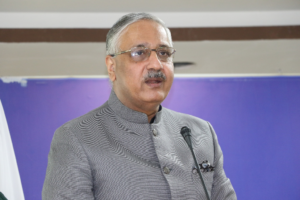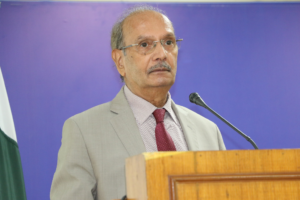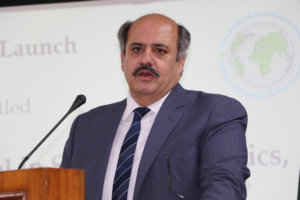Dr Jaspal’s New Book Explores South Asia’s Nuclear Landscape
Shazia Mehboob
Islamabad: India’s behavior in South Asia, the Middle East, and Far East increasingly portrays it as a rogue state involved in transnational killings. Reports suggest it has orchestrated the killings of 22 Pakistanis within Pakistan, a Canadian citizen on Canadian soil, and citizens of Bangladesh and Myanmar in their own countries.
Allegations also link it to attempts on the lives of UK and US citizens on American soil. These actions depict India as engaging in rogue activities abroad.
 These views were expressed by Gen (Retd) Zubair Mahmood Hayat at the book launch titled “Nuclear Arms Control in South Asia: Politics, Postures & Practices” by Dr Zafar Nawaz Jaspal at the Institute of Strategic Studies (ISS) in Islamabad on Thursday.
These views were expressed by Gen (Retd) Zubair Mahmood Hayat at the book launch titled “Nuclear Arms Control in South Asia: Politics, Postures & Practices” by Dr Zafar Nawaz Jaspal at the Institute of Strategic Studies (ISS) in Islamabad on Thursday.
Sharing his view on Dr Jaspal’s new book, the former CJCSC chairman said, “I find that all the contents of your book are academically rich and substantively solid. There are very few authentic Pakistani perspectives on the Indian-Pakistani nuclear postures and doctrines. Most narratives found through search engines seem to be biased or influenced. We need more indigenous narratives from people who truly understand the region and its complexities.”
Furthering his speech, Gen (retd) Zubair Hayat said India’s approach to arms control and non-proliferation can be understood across five domains:
- Ideological Domain: Influenced by Hindutva ideology, impacting regional disarmament efforts.
- Political Domain: Shaped by the evolution of Hindu Rashtra, influencing arms control dynamics in South Asia.
- Military Domain: Driven by India’s hegemonic ambitions, influencing the security landscape.
- Historical Domain: Involves India revising its historical narratives and projecting power globally through its vision of ‘Akhand Bharat’.
- Strategic Domain: India asserts itself as an aspirational power, challenging conventional boundaries of influence.
Institute of Strategic Studies, Islamabad (ISSI) Director General Ambassador Sohail Mahmood said global discussions about Pakistan’s nuclear intentions are biased, questioning its legitimate security concerns and legality of acquiring nuclear capability. Some countries’ policies towards Pakistan’s nuclear development are unfairly discriminatory.
Despite this, ISSI Mahmood said, Pakistan has pursued its goals with unwavering determination in its national interest, without violating any legal obligations. Pakistan has no need to apologize or defend its actions.

Strategic Vision Institute (SVI) Executive Director Dr Zafar Iqbal Cheema said Dr Jaspal’s book is a thorough study on arms control and nuclear issues in South Asia, long overdue. Pakistan has tried regional arms control measures with India, but India sees them as insincere.
SVI Cheema further said the book covers doctrines, deterrence, and nuclear postures comprehensively, providing valuable data for policymakers and students.
It highlights that Pakistan’s nuclear strategy is seen as militarized globally, lacking civilian oversight. Despite efforts to match India’s capabilities like subsonic missiles and ballistic defense, Pakistan faces challenges in the evolving global nuclear landscape.
Air Commodore Khalid Banuri noted, “Dr Zafar explains how global rules shape nuclear strategies, influencing regional politics. This book is essential for students and those in Pakistan interested in nuclear issues. It covers global and regional politics, connects regional history to global events, and elucidates how countries signal their nuclear intentions. Its accessible style makes it an excellent introduction to the topic.”
 Dr Zafar Nawaz Jaspal, Dean of the School of Politics and International Relations (SPIR) at Quaid-i-Azam University Islamabad, explained that the framework of the book primarily seeks to address four critical questions:
Dr Zafar Nawaz Jaspal, Dean of the School of Politics and International Relations (SPIR) at Quaid-i-Azam University Islamabad, explained that the framework of the book primarily seeks to address four critical questions:
- The philosophical constructions of nuclear weapons proliferation and nuclear arms control.
- The impacts of international nuclear politics on the decision-making processes of India and Pakistan.
- The evolving features of India-Pakistan nuclear doctrines and postures.
- Practical responses to nuclear arms control challenges.
We are on the brink of a technological revolution, particularly in the debate surrounding the third generation of nuclear weapons. This discussion now includes non-nuclear strategic weapons, integrating emerging technologies into delivery systems and defense systems. These advancements not only reduce response times but also increase precision and complexity, intensifying pressures during crises, especially in volatile economic environments, Dr Jaspal added.
Recent high-alert nuclear weapons exercises highlight a heightened global crisis. Unfortunately, it appears that hard power, particularly nuclear capability, is resurging despite efforts to promote disarmament, he said.
Director ACDC Malik Qasim Mustafa, Additional Secretary, Director General (ACDIS) AHQ Islamabad, Tahir Hussain Andrabi, Ambassador Khalid Mahmood, and others shared their views on the book.
Students, faculty members of QAU Islamabad, diplomats, and other attendees participated in the book launch event.
Gen (Retd) Zubair Mahmood Hayat shared his views in his personal capacity.

Comments are closed.